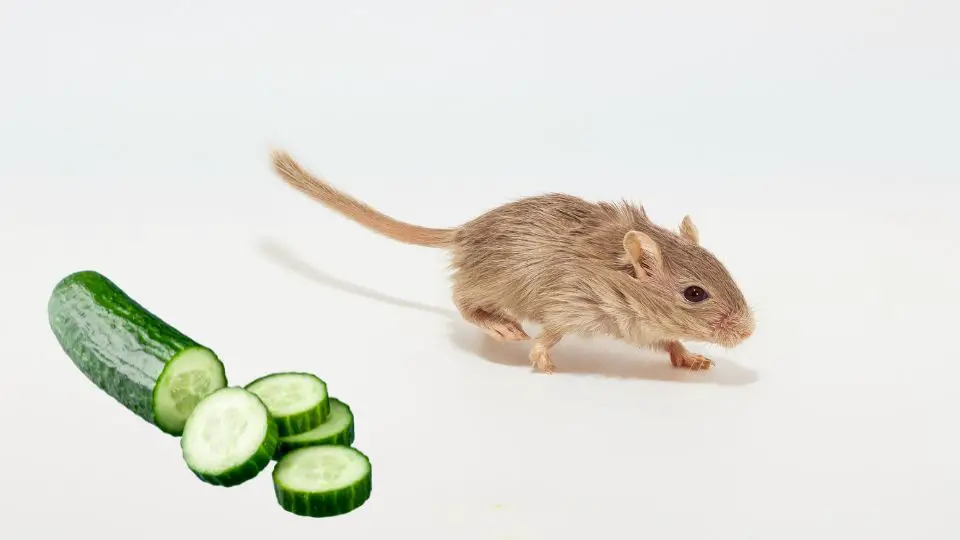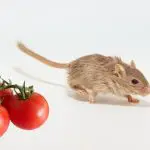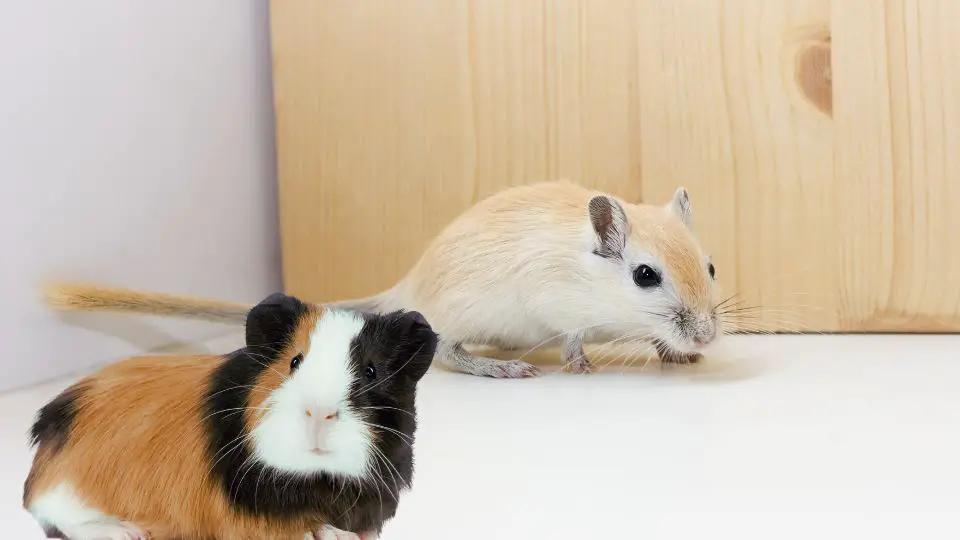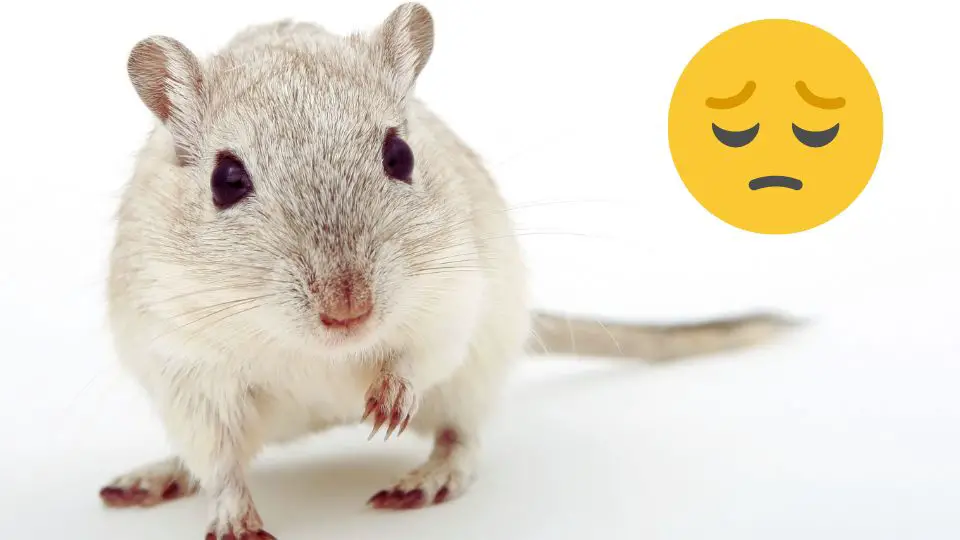Gerbils have specific dietary needs, and as responsible pet owners, it’s essential to provide them with a well-balanced diet. One question that often arises is whether gerbils can eat cucumber.
Yes, you can feed gerbils cucumber. Cucumber can be offered to gerbils as an occasional treat. However, it should not replace the main components of their diet. Remember to remove the seeds and peel, as they may cause digestive issues.
In this article, we will explore the suitability of cucumber as a treat for gerbils, considering its nutritional content and potential benefits.
Nutritional Composition of Cucumber
Cucumbers are composed mostly of water, making them an excellent choice for hydration. They are low in calories and fat, which can be beneficial for maintaining a healthy weight in gerbils. While they are not as nutritionally dense as some other vegetables, cucumbers still offer some essential vitamins and minerals.
One of the notable vitamins found in cucumbers is vitamin K. This vitamin plays a crucial role in blood clotting and maintaining bone health. Cucumbers also contain vitamin C, an antioxidant that supports the immune system and helps with collagen production. Additionally, they provide smaller amounts of vitamins A and E, which are important for eye health and cell protection.
In terms of minerals, cucumbers offer a modest amount of potassium, an electrolyte that helps regulate fluid balance and supports proper muscle and nerve function. They also contain trace amounts of calcium and magnesium, which contribute to bone health and various metabolic processes in the body.
Note that while cucumbers can provide some beneficial nutrients and hydration, they should not replace the main components of a gerbil’s diet. Cucumbers should be offered as an occasional treat or part of a varied diet that includes a balanced mix of high-quality pellets, fresh vegetables, and occasional fruits.
Can You Feed Gerbils Cucumber?
Yes, gerbils can indeed eat cucumber. It can be included in their diet as an occasional treat or snack. Cucumber offers a different texture and flavor to add variety to their meals, keeping things interesting for these curious little critters.
One of the benefits of feeding gerbils cucumber is its low calorie content. Cucumbers are composed mainly of water and contain very few calories, making them a healthy and guilt-free snack option for gerbils. This can be particularly advantageous for gerbils that are prone to weight gain or those on a controlled diet.
Cucumbers are generally safe for most gerbils, but you should note that individual sensitivities and preferences may vary. Some gerbils may enjoy cucumber and have no adverse reactions, while others may not show much interest or may have digestive sensitivities. You should introduce cucumber slowly and in small amounts to observe how your gerbil responds.
Remember that, while cucumber can be a tasty and hydrating addition to your small pet’s diet, it should not replace the main components of their nutritionally balanced diet. Gerbils require a mix of high-quality pellets, fresh vegetables, and occasional fruits to meet their dietary needs. Cucumber should only be offered in moderation, as excessive consumption can lead to digestive upset or diarrhea.
Can Gerbils Eat Raw Cucumber?
Yes, gerbils can eat raw cucumber. Raw cucumber slices can be offered to gerbils as a refreshing and hydrating snack. Just ensure that the cucumber is washed thoroughly before feeding it to your gerbil to remove any potential pesticides or residues.
Can Gerbils Eat Cooked Cucumber?
No, gerbils should not eat cooked cucumber. Gerbils are adapted to consume raw fruits and vegetables, and their digestive systems are not designed to process cooked foods. Cooking cucumber alters its texture and can make it difficult for gerbils to eat and digest. It’s best to stick to feeding gerbils fresh, raw cucumber slices to ensure their nutritional needs are met properly.
Precautions and Considerations
Cucumber can be a tasty and hydrating treat for gerbils, but remember to exercise caution and follow some guidelines to ensure their well-being. Here are some precautions and considerations that we recommend to keep in mind when offering cucumber to your gerbils:
- Moderation is key: While cucumber can be a healthy addition to a gerbil’s diet, it should be given in moderation. Treats should only make up a small portion of their overall diet, which should primarily consist of high-quality pellets and fresh vegetables.
- Remove seeds and peel: Gerbils may have difficulty digesting cucumber seeds, so it’s advisable to remove them before feeding. The peel of the cucumber can also be tough for gerbils to chew and digest, so it’s best to remove it as well. Offering peeled and seedless cucumber slices ensures easier consumption and digestion.
- Supplement, not replace: Cucumber should never replace the main components of a gerbil’s diet. It should be considered as an occasional treat or addition to their regular food. Remember to provide a balanced diet that includes a variety of vegetables, fruits, and gerbil-specific pellets to meet their nutritional needs.
- Monitor for sensitivities: While cucumber is generally safe for most gerbils, individual sensitivities may vary. Keep a close eye on your gerbil after introducing cucumber to their diet. If you notice any signs of digestive upset, such as diarrhea or bloating, it may be an indication that your gerbil is not tolerating cucumber well. In such cases, it’s best to discontinue feeding cucumber and consult a veterinarian if necessary.
Alternatives to Cucumber
While cucumber can be a refreshing treat for gerbils, it’s always a good idea to offer a variety of vegetables and fruits to ensure a well-rounded diet. Here are some alternatives to cucumber that you can safely provide to your gerbils:
- Carrots: Carrots are a popular choice among gerbil owners. They are rich in beta-carotene, which is beneficial for eye health. Cut carrots into small, bite-sized pieces to make them easier for gerbils to chew and digest.
- Bell peppers: Bell peppers are packed with vitamin C and provide a crunchy texture that gerbils enjoy. You can offer small slices of red, green, or yellow bell peppers as a nutritious snack.
- Zucchini: Zucchini is a mild-tasting vegetable that gerbils often find appealing. It contains vitamins A and C, as well as dietary fiber. Slice zucchini into thin rounds or small cubes for easy consumption.
- Apples: Apples are a great source of fiber and vitamin C. Remove the seeds and core, then cut the apple into small pieces before offering it to your gerbils. Remember to limit the amount of apple given due to its natural sugar content.
- Broccoli: Broccoli is a nutrient-dense vegetable that provides vitamins A, C, and K, as well as fiber. Offer small florets or finely chopped pieces of broccoli to your gerbils.
- Strawberries: Strawberries are a delicious treat that gerbils can enjoy in moderation. They are rich in vitamin C and antioxidants. Remove the green leafy tops and cut the strawberries into small pieces before serving.
Conclusion
In conclusion, while cucumber can be safely offered to gerbils as an occasional treat, it should not replace the main components of their diet. Cucumber is a low-calorie snack that can provide hydration and some essential vitamins. However, it is important to practice moderation and consider the individual sensitivities of your gerbils.
Always remove the seeds and peel, as they may cause digestive issues. Remember to offer a variety of vegetables and fruits to ensure a well-rounded nutritional intake for your gerbils. If you have any concerns about your gerbils’ diet or specific dietary restrictions, consult with a veterinarian for personalized guidance. By providing a balanced and varied diet, you can help support the health and well-being of your gerbils.







